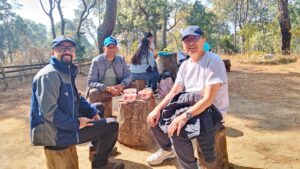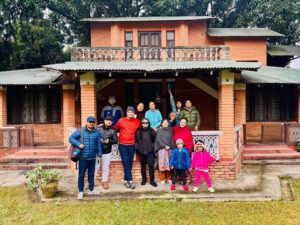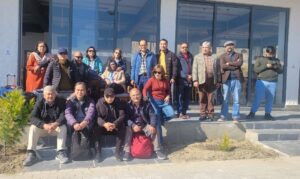Interview with PDG Graeme C. Archibald

PDG Graeme C. Archibald a member of the Rotary Club of Elgin, located in North Scotland, was the District Governor, representing Rotary District 1010 in Rotary year 2017/18. As a District Governor, Graeme C. Archibald played a key role in fostering service, leadership development, and Rotary’s mission in Scotland.


Could you share with us how you first got involved with Rotary and your journey to becoming District Governor of District 1010?
I became a member of Rotary Elgin in July 2000, invited by a colleague from work. The company I worked for in Elgin had strong ties to Rotary Elgin—one of its former directors was the Founder President of the club in 1927, and his son remained a member until his passing in June 2000, just weeks before I joined.
In the years leading up to my appointment as Club President for 2009/10, I chaired several committees as a team leader. After retiring from full-time employment in July 2011, I was encouraged to take on a role within our Rotary District. I went on to serve as Assistant Governor for District 1010 during 2012/13, 2013/14, and 2014/15, and later as District Governor in 2017/18.
Additionally, I served as a liaison Governor on the Rotary Great Britain & Ireland General Council for three years, from July 2015 to June 2018, focusing on international projects at RIBI.
Throughout the years, I have observed many different approaches to addressing challenges within our organization, particularly with regard to membership. While some ideas proved successful, others had little or no impact. The rise of “Breakfast” clubs was among the more successful innovations, and the shift away from serving meals at every meeting has also been a popular change.
The Rotary Club of Elgin is celebrating its 100th anniversary. Can you tell us more about your club and its history? What are some of the key projects or initiatives that your club has been involved in over the years?
The Rotary Club of Elgin held its first meeting on 6th January 1927 and received its official Club Charter on 25th November 1927. Currently, we have 63 members, with three more expected to join in the coming weeks. This will make us the largest club in District 1010, which covers the North of Scotland. The district consists of 85 clubs with nearly 2,000 members in total.
We also have three honorary members, including HRH The Princess Royal, who has been a regular visitor to our club over the years. It was a great honor for the club to receive The Queen’s Award for Voluntary Service, and HRH insisted that she, as a member of our club, be the one to present the award to “Her” club.
I often reflect on our club’s achievements, thanks to visionary business leaders dedicated to our community. One major fundraiser was the Rotary Marafun, where teams of five runners completed a total marathon distance, raising funds for local causes. Proceeds helped purchase a new hospital scanner and raised over £100,000 for The Oaks, a palliative care facility in Elgin.
Another successful initiative was the Rotary Whisky project, which generated over £50,000 for the End Polio campaign. Initially sold as Rotary Malt, it was later rebranded to Fellowship Malt after a policy breach but still benefitted the campaign.
While fundraising has become more challenging in recent years, we continue to explore new opportunities, such as a charity golf day, to support our causes.
Your Club has thrived for 100 years. What do you think are the key factors or strategies behind the club’s long-standing success? Also, could you provide some insights into the club’s membership, culture, and regular meetings?
We strongly believe that regular meetings are a key element in maintaining membership. We have developed our own club mentoring scheme to ensure new members feel included from the day they join. Our membership team holds regular meetings with new members to understand what works well for them and what could be improved. We learn from their feedback and use it to help sustain our membership numbers. Personal introductions continue to be the most effective recruitment method, but this year, we are exploring the possibility of corporate membership. Be willing to experiment and take risks—it may fail, but it could also prove very successful.
Currently, Rotary International is experiencing a decline in membership. How do you assess the current state of membership within Rotary? What do you identify as the primary challenges in attracting new members? Additionally, could you provide the current membership status of your district?
Within Great Britain and Ireland (RGBI), like many areas worldwide, we have seen membership numbers decline as our clubs age. Many clubs struggle to recruit younger members, often failing to respond to the messages regularly delivered by the District. The ultimate outcome for some is the dissolution of clubs. Our district mirrors other parts of RGBI, having lost five clubs in the past year. However, in one case, the closure occurred because none of the members were willing to take on leadership roles. As a result, the club ceased operations, but around 15 members joined a neighboring club, so the overall membership loss was not as significant. As I mentioned earlier, we currently have 85 clubs in our district with nearly 2,000 members, but the age profile is a real concern.
Your club partnered with Rotary Club of Boudha on a Global Grant project. Could you elaborate on how this partnership came about and the impact of the project?
It has been a privilege to collaborate with the Rotary Club of Boudha on our recent Water, Sanitation, and Education project. Our involvement in such initiatives began in 2002, following a visit by three Rotary Club of Elgin (RCE) members to Nepal to support a health camp in Humla in partnership with the Nepal Trust.
While in Nepalgunj, they connected with local Rotarians from Rotary Club of Nepalgunj, who encouraged us to consider a water and sanitation project. After initial communication issues, we partnered with Water Aid UK and NEWAH, leading to our first successful project in southwestern Nepal.
In 2004, RCE members visited Nepal and were impressed by NEWAH’s work, prompting a second project focused on a community school near Janakpur, completed in 2007. In November 2007, over 20 Rotarians and partners visited the finished project. We then secured Global Grant assistance for projects on water, sanitation and educational programs in Nepane and Simle villages, with Rotary Club of Himalayan Gurkhas. In November 2010, a group of 24 Rotarians and partners visited to see the completed work.
For our fourth project, we collaborated with the Rotary Club of Baglung in the remote villages of Kades and Bhaja. Access was challenging, often requiring 4×4 vehicles, but the warm welcome we received was unforgettable. The Kades community even declared a local holiday in our honor, expressing deep gratitude for the fresh water, sanitation, and education programs we delivered, complete with Tikka ceremonies everywhere!
In 2018, we returned to Nuwakot, collaborating with the Rotary Club of Tripureswor and President Bijaya Sainju in Majhtar. We also revisited Nepane, where we funded repairs to a school toilet block damaged by the 2015 earthquake. The visit highlighted both the successful repairs and the lasting impact of our 2010 water project on the community.
In 2019, we partnered with the Rotary Club of Boudha on a project in the Siureni Bhanjyangkharka community in Bethanchowk. The project was completed in January 2022 with Global Grant assistance. This collaboration significantly enhanced the scale and impact for the local community. After six visits to Nepal, I remain inspired by the outstanding Rotary clubs and communities we’ve worked with. Each project has been rewarding, and we always make time to explore Nepal’s remarkable heritage and beautiful landscapes.

What challenges did you encounter during the Global Grant project with Rotary Club of Boudha (RCB), and how were they overcome? What have been the most rewarding aspects of this collaboration?
When we first met the Rotary Club of Boudha (RCB) and Founder President Chhongba Sherpa, the club had just been chartered and was navigating the complexities of securing Rotary International support through Global Grants. Despite these challenges, our partnership resulted in a unique and successful project we can all be proud of.
The project’s delivery was not straightforward, but RCB consistently visited the site throughout its duration. In March 2022, members of RCE and supporting UK clubs visited and were profoundly impacted by the outcome, eager to return.
We hope RCB will collaborate with us again on future water, sanitation, and education projects. As for RCE, we look forward to our centenary in 2027, with plans for a “Centenary Water & Sanitation Project” aimed for completion by December 2027. RCB has identified a potential site, and NEWAH is developing specifications and cost estimates.
Our involvement in future projects should be smoother, as we now understand the Grant schemes and how to partner effectively with local municipalities to benefit more communities and schools.

How important do you think international collaborations are for Rotary’s mission? What role do you see these partnerships playing in the future of Rotary? Are there plans to pursue more projects with Rotary clubs in District 3292, which includes Nepal and Bhutan?
I believe my comments above reflect our forward-looking approach. By building on over 20 years of experience, we are able to leverage past successes and collaborate with many of the smaller clubs in our District. These clubs are always eager to participate in international projects but often lack the resources to take on initiatives of the scale we pursue. Through our partnerships, they too can become involved, and they greatly value the feedback and updates we provide throughout the process.
How has your personal experience as a Rotary leader influenced your perspective on community service and leadership?
In a word – immensely. The fellowship, and involvement in community and international events have all impacted me in different ways. Being of service, without expecting acknowledgment, is a great feeling. Teamwork and utilizing personal skills are also rewarding in their own ways. Everywhere you turn, you can find someone in need.
However, I have to say that one of the most significant and impactful experiences I had was during my first visit to Nepal in 2004. Seeing what our fundraising efforts achieved in a remote area of southwestern Nepal truly tugged at my heartstrings.
How has your involvement in Rotary impacted your family’s life? How many of your family members are also involved in Rotary activities?
Rotary has certainly had an impact within the Archibald household. While I have traveled to Nepal on six occasions, my wife has accompanied me on the last five trips. Rotary comes up regularly throughout the week in various ways. My eldest daughter is also a member of Rotary Elgin and is currently the President Nominee. My eldest granddaughter is a member of an Interact club at her secondary school, and her younger sister was president of her primary school’s RotaKids club (for 9–12-year-olds) last year. In June, her RotaKids club organized a sponsored walk around one of the parks in the center of Elgin, raising about £365, which will go towards the next Water Project in Nepal that we are currently working on.
What advice would you give to someone who is new to Rotary and looking to make a meaningful impact, both locally and globally?
In so many organizations, involvement is critical. In many cases, the more you put in, the more you get out. Rotary is a worldwide organization, and it’s important to take the opportunity to visit other clubs, both domestically and internationally. The fellowship that these opportunities provide cannot be overstated, and the “learning curve” from seeing what happens elsewhere brings new ideas back to the home club. Our new member mentors continually strive to share their experiences, and their involvement in team and club meetings contributes to the learning and development necessary for sustaining Rotary membership.
Looking ahead, what are the future plans or goals for the Rotary Club of Elgin? Are there any upcoming projects or areas of focus you’re particularly excited about?
Currently, we hope to increase our membership by 8 to 10 new members this year. So far, 5 have been inducted, and three more are pending.
The “Centenary” committee is also developing plans for 2027/28, focusing on the initial feedback from a members’ discussion evening where over 200 ideas were recorded. These ideas have been refined and duplicates eliminated, resulting in proposals for a major local community project, efforts to promote our image in the Elgin area, and an international project, with a centenary water project in Nepal high on the list.
A number of fundraising events are planned for this year as we continue to support the Rotary Foundation and the End Polio campaign, along with our annual collections at Christmas, with proceeds going to deserving local beneficiaries.





